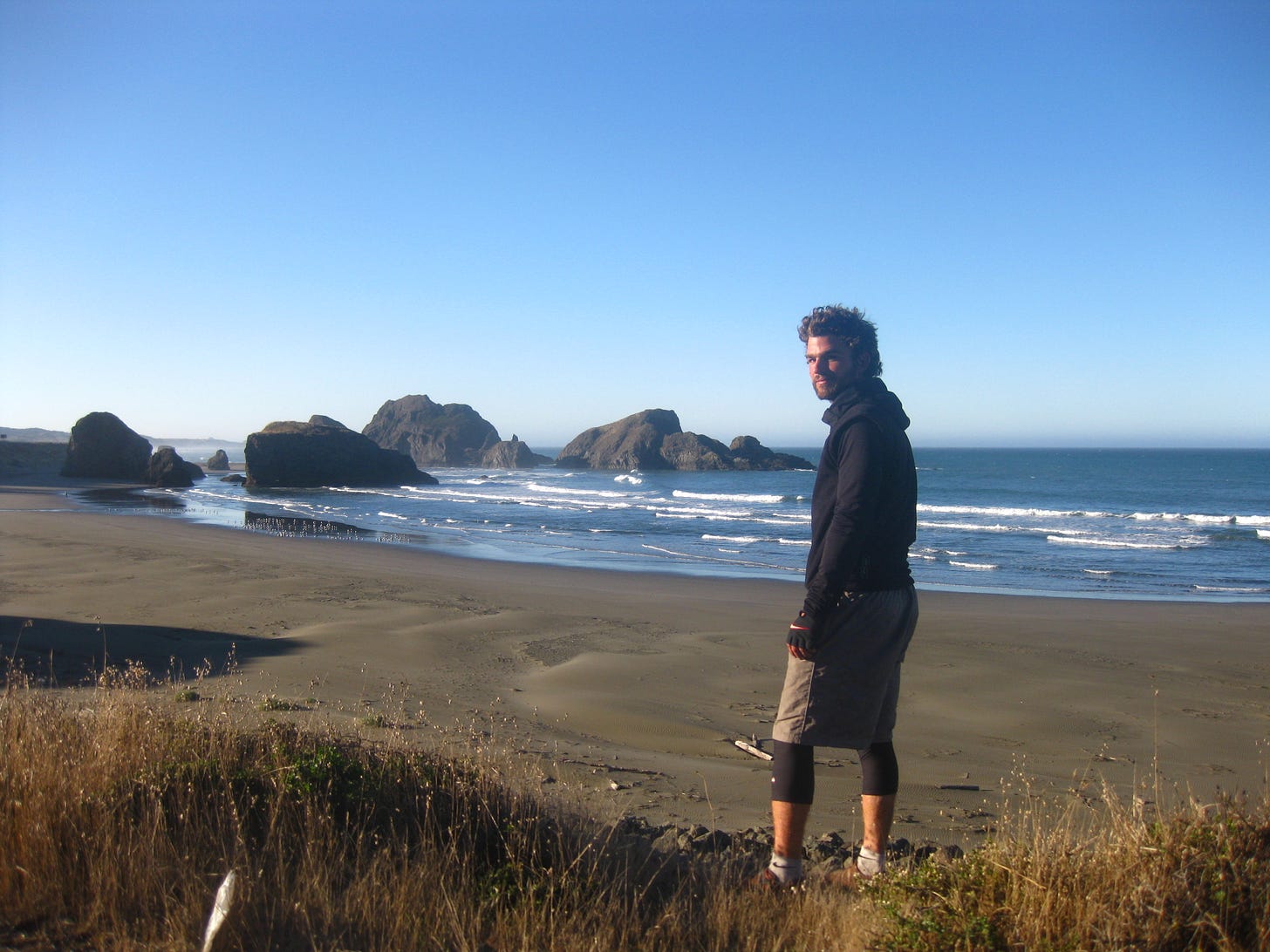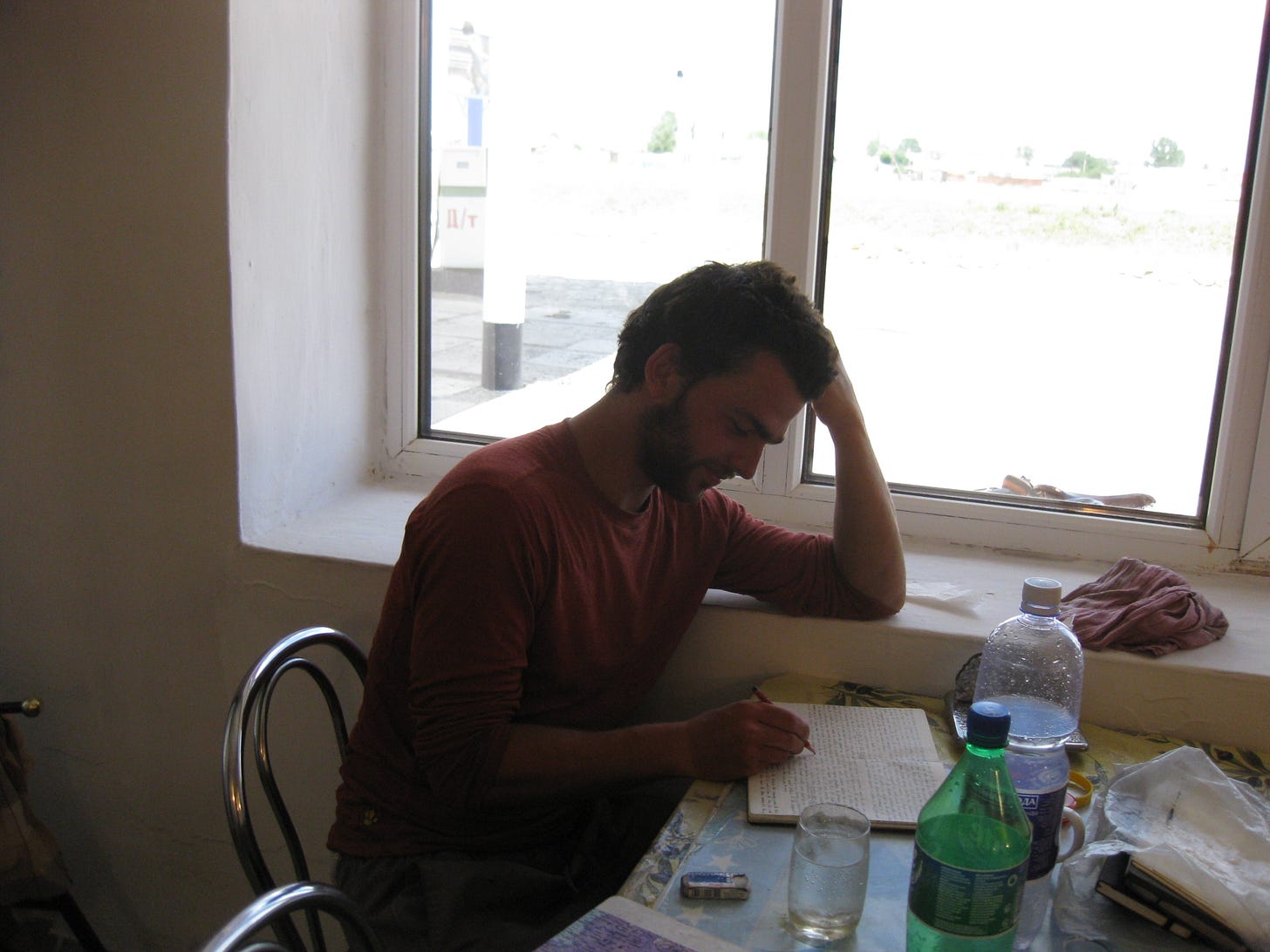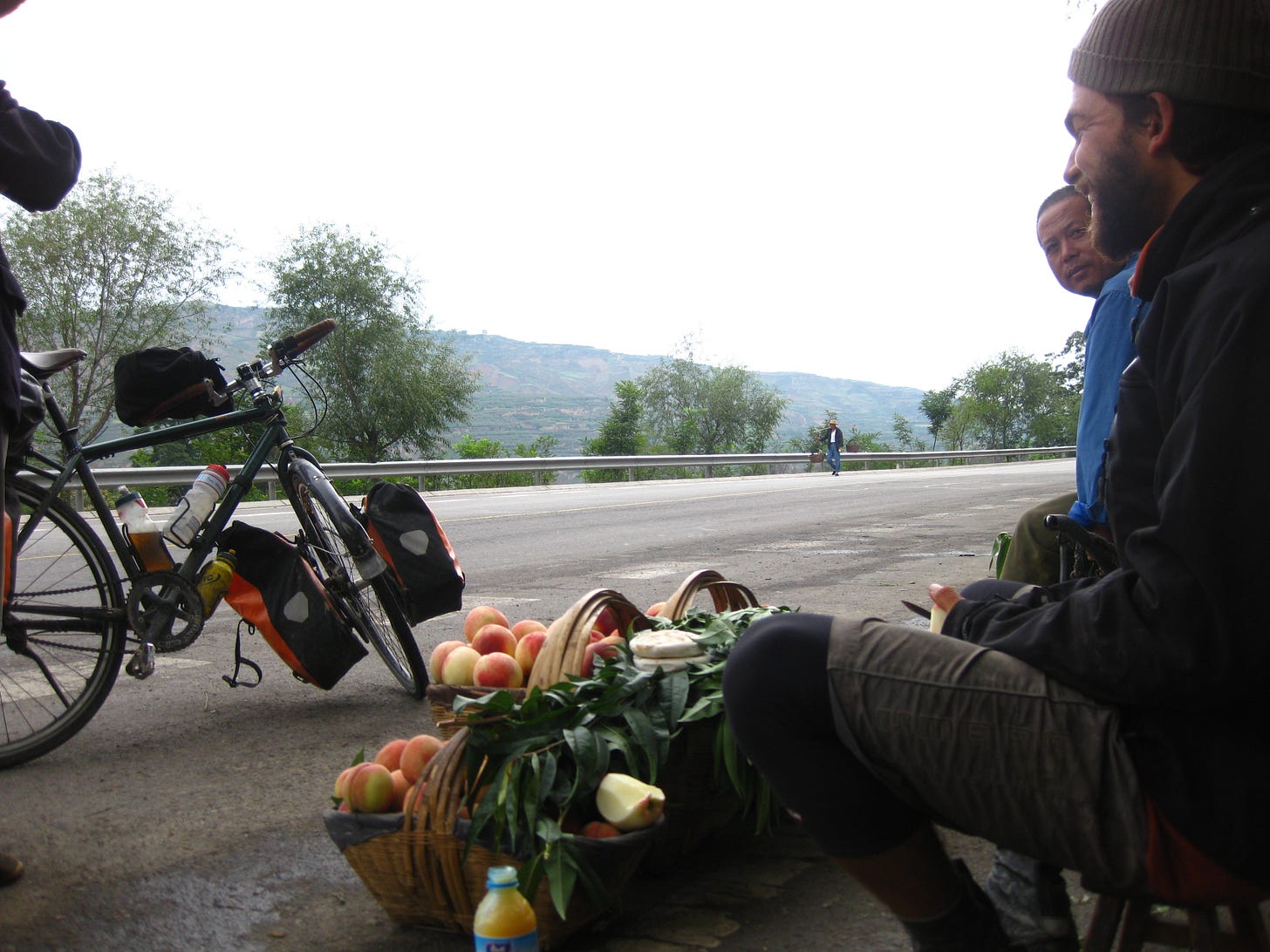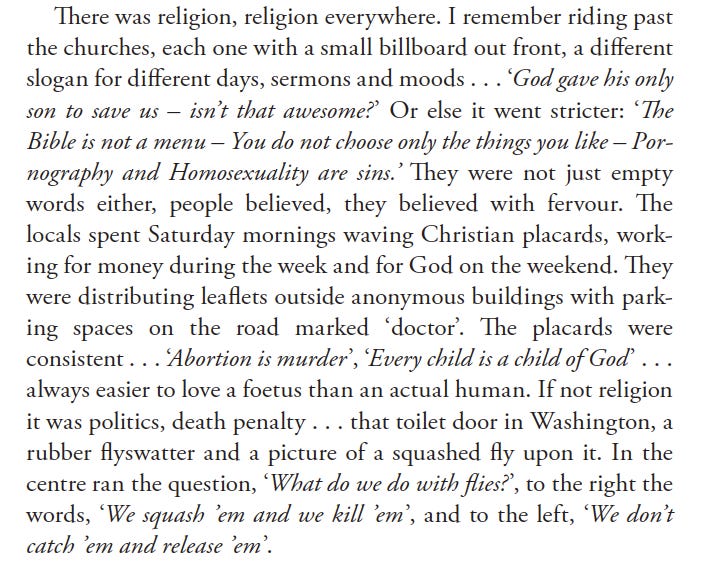Editing for change: A second edition of Life Cycles
Looking back on shifts in the world, adventure and my first book
Nearly fifteen years since I cycled round the world and nearly ten since the publication of my first book, Life Cycles, I’ve been surprised how moving I’ve found the fact it now rides again and rises in a second edition.
I don’t want to say too much about that process of reflection - how me and the world changed, how the adventure world changed to such an extent that we now call it an adventure industry - because the new edition is prefaced by a short essay on those very points. What has the advent of smartphones and full-blown social media meant for adventure? How has satellite tracking moved on since my own rudimentary version of it?
Not that I take any pleasure from being somewhat vindicated by a broadening in the view that the world is on a sub-optimal pitch, I can’t help but notice that the force of my views of 2009 — that we needed to look out for society and some things - such as adventure - needed to be safe from corporate predators — saw me dubbed the “angry, young man” of touring cycling, whereas events since - Trump, Brexit, climate change, growing inhumanity to refugees - made that notion of being angry quite common, and even to an extent quite fashionable. The new edition has a fuller version of these thoughts too, so I’ll hold back from developing them much here.
Judge a book by its cover
There are, however, a number of things I can talk about that were too trivial, personal or tangential for that essay. Firstly I love the new cover, taken from a photo in Kazakhstan that has for whatever reason always been very close to my heart - perhaps because it held my defining view of Kazakhstan, and with it the mood of a place I felt so at peace in riding. The previous cover, though of course now endearing to me, never quite summed-up the book as I saw it - a book of politics at roadsides - and although some readers perhaps bought it expecting a tale of armchair adventure and appreciated political reflections from the world thrown-in, some were probably disappointed with that, while others maybe never picked-it up to begin with. On a purely personal level, that first cover just never matched what the book was to me.
Inside are changes too. The book no longer has a plate of photos, which increase production costs and for whatever reason I never felt essential anyway. It does now have a map of my route, a ridiculous oversight in the first edition. The book’s first publisher had always pitched Life Cycles as a mass-market title, and when that didn’t strike home it was quickly relegated from any priority at all. This was particularly galling as the text included typographical errors stemming from foreign-alphabet characters that were mysteriously and frustratingly not reproduced in the journey from the word document to the final, typeset piece.
In an exclusive, behind-the-scenes of how that first Life Cycles came about, I can now report that edition was given its final round of copyediting by someone who totally butchered my (admittedly at times different) writing style into the strict grammatical formats of a mass-market publisher. The fluidity and my efforts at storytelling intimacy were all, to my mind, destroyed. Fortunately, my main editor agreed and I was given permission to change mostly everything back, but because this close-to-publication editing process created fundamental changes that were themselves then fundamentally changed, basic errors arose - particularly in tense - from such dramatic shifts being made when we should have been fine-tuning the final text. I’m really happy to have all these now fixed.
Self-censoring & Sensitivity
With probably less furore than the estate of Roald Dahl releasing a modernised, sensitive version (alongside a re-release of the originals, so that the entire controversy was doubtless great for business) of Dahl’s multiple children’s classics, Life Cycles too has been edited for sensitivity and a different time. Where Dahl’s books have had their altered versions updated to take out wisecracks or meanness invoking ethnicity, body image, or stupidity, my internal concerns (shared by some readers) with Life Cycles had always been most centrally about how I wrote, in particular, China.
Though the original nevertheless made clear that I was the idiot choosing to ride through an entirely foreign country at 110 miles a day, even with that proviso, some of the frustrations I express, and alienation I felt, in China - for me - cross a line into something quite xenophobic and overly concerned with appearance, or the sound of Mandarin, that just comes across prejudicial. We live a climate of extreme Sinophobia, with potentially dangerous global political fallout, and where Chinese people are often depicted as an unthinking billion-strong mass. I feel now that some of the tone I wrote in then contributes to this. Influenced in part by years ago reading the book Away with all Pests, about an English surgeon in 1950s rural China, and being profoundly moved by the thoughtfulness, patience and humanity of his observations, I couldn’t help but grow steadily more embarrassed at the lack of all this in some of my own. I also wrote of the wonder of China, and I think I got some things right about the impact of its frantic pace of economic development, but it still feels something of a missed opportunity (as in some ways does so much of a journey I travelled at speed) that I didn’t take in more of China, and more thoughtfully.
A few other examples. I felt I in one section wrote the features of black Louisianans in ways needlessly attentive to race. I’m pretty sure I’m insensitive in the way I write the visibility of obesity on arriving to New Zealand, after months where the healthy diet and more active lives of those across Asia (central, east and southeast) made for visibly much fitter populations. These parts, as well as the racist jokes of a trailer family, I left mostly untouched, because part of the gift of travelling the world is the opportunity to look at and write striking differences. We do have racism, and we do have a public health crisis of obesity in the West, so that it seems a disservice to mask these things entirely, and I do generally believe humans are, or have to be, robust enough to deal with the occasional simplistic remark. Overall I think it’s a very healthy thing that campaigns such as the Black Lives Matter movement have prompted a consciousness about how we write on ethnicity that - in my defence - I simply feel wasn’t present, or mainstream, when I was writing in 2009.
For those who think it’s important that we judge things by the standards of their own time, I don’t disagree at all. I even think it is a crucial service to preserve something of the forward journey, because if you remove the existence of that journey then with it you lose the sense of possibility to keep pushing forward as we still doubtless must. With this in mind, I still think there’s enough left in there that someone could well still judge me an asshole for the way I write about people and difference, and I’m ok with that. The changes I made were all made very consciously, and less to give an impression that even then I was so smart and enlightened, but more because I found myself asking why it was necessary, and what service it performs, to keep examples of needless offence in circulation.
I do think the heart of the book still comes through clearly as one of good intention. So keenly, then as now, I saw a world-gone-wrong and I rode only with a wish that corporate food shouldn’t exacerbate a public health crisis, that Chinese people should have more rights in the face of top-down growth policies, and where rampant poverty, joblessness and under-education wasn’t such a blight in the remoter parts of Louisiana that I was privileged to travel in. I wrote then also with the sense of man-against-world that perhaps typifies the young cyclist, particularly a male one, and as always a part of me longs to re-tread that journey and to write it with the calm of a slower schedule, more years, and a more patient pen.
The world today
Against all that, I enjoyed finding that in its granular, roadside observation of the world in passing, much of the book still feels valuable, and remarkably current, even now.
Topical to so much news of now, I was reminded of my reflections on the prevalence of nationalism in Russia.
Indeed, one of the reasons - aside from the dangerous Western rush to consistently escalate the war in Ukraine - I have little interest, and much caution, in the way the media looks now to vilify Russia and Vladimir Putin, is that the basic issues of nationalism and oligarchy (not to mention brutality in Chechnya) were apparent back then and before, in times when the US and UK were glad to regard that state a firm ally.
Working more as I now do on the politics of Türkiye, Palestine and countries the West regards as The Middle East, and views habitually through lenses of religion, I also enjoyed the reminder of my first ever impressions of the United States, a country I since came to spend a lot of time in, and know much better, but that then was entirely new.
And there were also those observations of China that I still feel were useful insight. I remembered in re-reading how much of my antipathy towards the country, particularly Beijing, was rooted in its repression of the Muslim population of Uyghur. I have never forgotten that I was there and impacted directly by the 2009 Uyghur uprisings that began the tyranny against Uyghur that is ongoing, but it was interesting, looking back, to reflect how my fierce objections have since become mainstream foreign policy opinion.
That all this was in plain sight then, and yet met mostly with official silence, is an evidence of the cynical ways in which foreign policy establishments work. The official concern about Uyghur that since grew is motivated more by furnishing the growing industrial and military competition with China, and less the moral imperative of human suffering. That does not mean that such concern should not be voiced and amplified, but it drives home how foreign policy between states should always be seen as a balancing of self-interests among actors who are - sadly - seldom moral. To lose sight of this is a considerable danger to publics, public discourse, and even - in its own small way - international relations.
What’s next?
In these countries - Russia, China, US - perhaps more than the rest I realised, re-reading Life Cycles, that I rode through sections or entireties of perhaps the three most important countries of the last century on earth. I since of course rode through Palestine for Fifty Miles Wide. Kyrgyzstan was a great privilege to ride and write if only briefly last year. I am excited for my forthcoming book on the ride through Türkiye. One day I hope my material from riding Tunisia will form part of a greater project, and so too other riding plans currently in the works.
It was an accident of simply loving riding that had me cycle in so many places, and the universality of the act of cycling, and my interest in the world, now gradually grows as a catalogue where I realise how far I’ve been, and perhaps come. The world is becoming a more multipolar affair with more competing poles of more interconnected powers. This has the potential to be dangerous, and yet is also the condition for the more unified and balanced world that I believe to be essential, inevitable, desirable. The bicycle, in its human-scale, imperative of balance, and by the cyclical movement of its wheels, is to me every bit as much the perfect metaphor and vehicle of this process.
By it I look forward as ever to seeing more and, I hope, finding out more.










